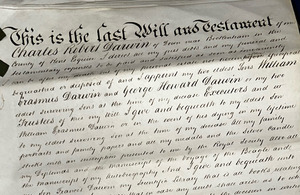Easier access to historic wills under new government plans
Genealogists, historians and amateur family archivists will be better able to access historic wills under proposals published today (15 December 2023).

- proposals to digitise millions of wills in overhaul to storage system
- historians and ancestry enthusiasts could better access wills dating back to 1800s
- paper wills for notable figures like Darwin and Dickens to be preserved for posterity
The ambitious digitisation programme could see millions of wills dating back more than 150 years moved online and more easily accessible to the public in a bid to improve the current storage system.
Currently about 110 million physical documents are stored costing taxpayers £4.5 million per year. The consultation is seeking views on keeping hard copies for about 25 years, in recognition of their sentimental value to families, while saving them digitally longer term.
Where wills belong to notable individuals or have significant historical interest the physical copies would remain preserved. The wills of Charles Darwin, Charles Dickens and Diana, Princess of Wales are among those currently stored at the Ministry of Justice facility in Birmingham.
Justice Minister Mike Freer said:
Historic wills can provide us with a unique window into the past and we want to make it as easy for amateur and professional historians alike to access these documents.
Digitalisation allows us to move with the times and save the taxpayer valuable money, while preserving paper copies of noteworthy wills which hold historical importance.
Presently where wills are submitted for scrutiny, predominately when people apply for probate, the High Court is required to preserve them permanently – and has done since 1858.
The process of scanning wills and supporting documents is already in place, as routine digitising began in 2021, however this has not extended to any documents submitted before 2021.
If people wish to access these wills or documents, they must apply and wait for them to be removed from storage and digitised so a copy can be sent out. This process can take weeks.
Under the proposals, a programme of working backwards to digitise all older documents will begin. Once digitised, access requests will be serviceable much more quickly.
The consultation also suggests exceptions should be made to preserve the original paper wills of famous people for historic record. It is seeking views on drawing up suitable criteria for those decisions.
The consultation will end on 23 February 2024.
Notes to editors
- The legality of a will is something that needs to be established. In many cases this is done by the courts in granting probate, however, in a very small number of cases wills can be subject to challenge. For example, by an allegation that a fraud was committed, or undue influence exerted on the person making the will. That means the court will need to check the will and it is held in case challenges are made.
- Since 2021, digital copies have been made of wills and supporting documents in all new probate applications. This system has been working well, with more than half a million digitised so far.
- The consultation paper is also seeking views on whether all the supporting documents currently held permanently need to be retained – for example deed polls, affidavits etc.